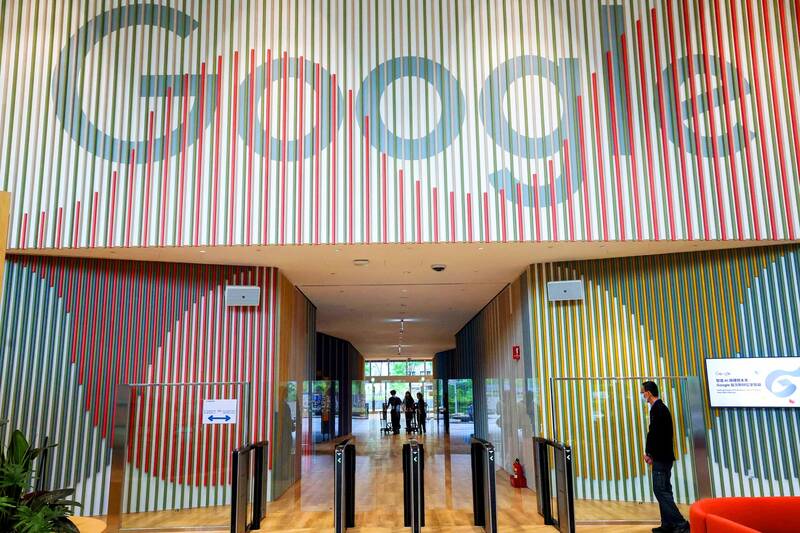President Tsai Ing-wen (蔡英文) yesterday attended an event marking the opening of Google’s second hardware research and development (R&D) office in Taiwan, which was held at New Taipei City’s Banciao District (板橋).
This signals Taiwan’s transformation into the world’s largest Google hardware research and development center outside of the US, validating the nation’s economic policy in the past eight years, she said.
The “five plus two” innovative industries policy, “six core strategic industries” initiative and infrastructure projects have grown the national industry and established resilient supply chains that withstood the COVID-19 pandemic, Tsai said.

Photo: CNA
Taiwan has improved investment conditions of the domestic economy and strengthened its pull on major global investors, with the volume of foreign investment rising to US$11.25 billion last year, she said, adding that the average annual foreign investment volume in Taiwan was US$10.3 billion between 2016 and last year, up from US$5.36 billion between 2008 and 2015.
The surge in foreign investment shows that the nation has further cemented its position in global supply chains and raised its profile on the world stage, Tsai said.
The president thanked Google for contributing to the government’s “Smart Taiwan” initiative, including efforts to upgrade the information technology sector, increase the application of smart technology in industries and scale up Taiwan’s digital economy.
Google has demonstrated corporate social responsibility by providing educational resources to rural schools and joining the National Institute of Cyber Security in the fight against fake news and cyberattacks, Tsai said.
It has been 11 years since Google established its first regional-level data center in the nation and it is currently building four undersea cables to connect Taiwan to the world, Premier Chen Chien-jen (陳建仁) said.
This is to establish Taiwan as a key nexus through which global digital data would flow, bolstering the nation’s competitiveness and importance to the international community, he said.
Google opened its first Taiwan office in 2006 and has presided over the continuous growth of its Taiwanese team since then, Google vice president of hardware Elmer Peng (彭昱鈞) said.
The tech giant’s team in Taiwan, which is 20 times larger than its size 10 years ago, now recruits workers from more than 30 countries and regions around the world, Peng said.

South Korea’s equity benchmark yesterday crossed a new milestone just a month after surpassing the once-unthinkable 5,000 mark as surging global memory demand powers the country’s biggest chipmakers. The KOSPI advanced as much as 2.6 percent to a record 6,123, with Samsung Electronics Co and SK Hynix Inc each gaining more than 2 percent. With the benchmark now up 45 percent this year, South Korea’s stock market capitalization has also moved past France’s, following last month’s overtaking of Germany’s. Long overlooked by foreign funds, despite being undervalued, South Korean stocks have now emerged as clear winners in the global market. The so-called “artificial intelligence

NEW IDENTITY: Known for its software, India has expanded into hardware, with its semiconductor industry growing from US$38bn in 2023 to US$45bn to US$50bn India on Saturday inaugurated its first semiconductor assembly and test facility, a milestone in the government’s push to reduce dependence on foreign chipmakers and stake a claim in a sector dominated by China. Indian Prime Minister Narendra Modi opened US firm Micron Technology Inc’s semiconductor assembly, test and packaging unit in his home state of Gujarat, hailing the “dawn of a new era” for India’s technology ambitions. “When young Indians look back in the future, they will see this decade as the turning point in our tech future,” Modi told the event, which was broadcast on his YouTube channel. The plant would convert

‘SEISMIC SHIFT’: The researcher forecast there would be about 1.1 billion mobile shipments this year, down from 1.26 billion the prior year and erasing years of gains The global smartphone market is expected to contract 12.9 percent this year due to the unprecedented memorychip shortage, marking “a crisis like no other,” researcher International Data Corp (IDC) said. The new forecast, a dramatic revision down from earlier estimates, gives the latest accounting of the ongoing memory crunch that is affecting every corner of the electronics industry. The demand for advanced memory to power artificial intelligence (AI) tasks has drained global supply until well into next year and jeopardizes the business model of many smartphone makers. IDC forecast about 1.1 billion mobile shipments this year, down from 1.26 billion the prior

People stand in a Pokemon store in Tokyo on Thursday. One of the world highest-grossing franchises is celebrated its 30th anniversary yesterday.